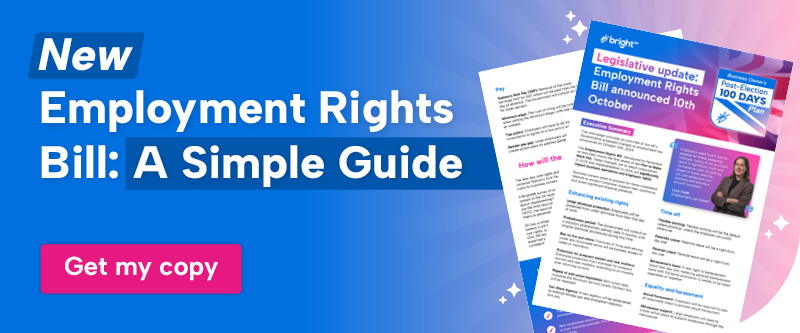First published on Thursday, October 10, 2024
Last updated on Tuesday, October 22, 2024
Small businesses are set to be hit the hardest by Labour’s Employment Rights Bill which could cost businesses up to £5bn a year.
Labour’s “once-in-a-generation” overhaul of workers’ rights in their new Employment Rights Bill 2024. The Bill, which proposes 28 radical employment law reforms, received its second reading in Parliament on the 21st of October 2024.
The British Chambers of Commerce warned that companies risk being buried under a mountain of additional costs. And a recent report from the government reveals the true cost for business owners could be as high as £5 billion a year to implement.
Understandably, it’s a lot for small businesses without dedicated HR support to take on board. So, what changes can small business owners expect and what steps can you start taking now? Let’s break it down…
First things first...
What’s missing from the original proposal?
The Bill is jam-packed with changes, but it’s important to know what’s missing since original proposals:
The Right to Disconnect: Despite previous proposals, there has been no law yet to stop employers from contacting staff after hours. This will be handled by a Code of Practice.
Equal Pay: Issues like pay gaps for disability and race will be addressed in a separate Equality Bill.
Employment Status: There has been no changes to the legal distinction between ‘employees’ and ‘workers’ yet. This needs more consultation.
Parental Leave, Carers Leave, and TUPE: These have been mentioned but not covered in this Bill.
Now, on to what business owners can expect from the 150-page bill, containing 28 reforms.
Removal of the 2-year qualifying period for unfair dismissal
Labour has proposed to give employees’ the new right to unfair dismissal from their first day of employment, removing the current qualifying period of 2 years.
This is still under consultation. But the government are discussing setting a statutory probation period of 9 months. This aims to help employers properly assess an employee’s suitability for a role, while giving workers’ strengthened rights from their first day of employment.
What are the main considerations for employers?
Firstly, recruitment and hiring processes will need to be tightened. Because it will be a lot harder to dismiss employees in their first 12 months of employment, small businesses will need to make sure they’re investing in the right candidate management tools to make sure their skills suit the role long term
New employees should also be given more support in their induction periods including clear objectives
Updates will need to be made to employee handbook, contracts, and the probation and performance management process will need reviewing
BrightHR’s Payback Calculator shows it costs the average business £590 to draft a single HR policy, and with 40% of UK business owners concerned about the cost of implementing the changes—finding a financially-effective way to update HR policies will be crucial.
Exploitative practices like zero-hour contracts and ‘fire & rehire’ could be restricted or banned
Within the Bill there’s also proposals to ban the use of ‘exploitative’ zero-hours contracts replacing them with a new right for employees to have guaranteed hours if they work regular hours over a defined period.
Similarly, the government is proposing either a restriction on, or outright ban of, ‘fire & rehire’ practices. This refers to the practice of making contractual changes to an employee’s terms and conditions by terminating an employee and then re-hiring them on new terms.
What are the main considerations for employers?
It’s advisable for organisations who use zero-hour contracts to identify how they monitor hours worked, how they can manage a reference period, and assess how many individuals are currently on this kind of contract and whether this is practical
Industries that rely on the ‘fire & rehire’ method will need to make sure they keep ahead of consultations on this topic
The current code of practice remains in place until further notice, so employers still need to pay close attention to the rules until it’s been confirmed they’re changing
For instant, jargon-free advice on complex employment law topics, ask Brainbox: Can I fire and rehire?
Flexible working to become a default right “where practical”
Back in April 2024, flexible working rights were extended giving employees the right to request 2 flexible working requests in a 12-month period from their first day of employment.
Labour is proposing flexible working becomes a default right from day one where this is practical. Business owners should have already put new practices in place to deal with flexible working requests in line with Aprils changes. But should Labour go ahead with this proposal here are a couple of considerations they will need to make. What are the main considerations for employers?
Flexible working conversations will need to be had earlier in the recruitment process
Flexible working options must be added into staff handbooks and contracts of employment
All current flexible working communications, policies, and procedures need to be reviewed
Statutory Sick Pay lower earnings limit to be scrapped along with the 3-day waiting period
Labour is proposing to make Statutory Sick Pay (SSP) a right from day-one of illness and employment. Removing the lower earnings limit band has also been proposed.
Penalties for breaching these rules will be dealt with by Labour’s Fair Work Agency, including failure to pay sick pay from day-one. So, it’s important you understand your legal obligations for employee sick leave and sickness pay.
What are the main considerations for employers?
Managers and employees must be made aware of the changes
Policies like absence, attendance, and return to work policies plus employee contracts should be reviewed carefully
Employers must have an effective sick pay system in place
Reform ‘fire and rehire’ practices
The Employment Rights Bill restricts ‘fire and rehire’ practices, making it generally unfair to dismiss employees for refusing contract changes. Dismissal and re-engagement are only allowed to avoid serious financial threats to the business.
What are the main considerations for employers?
Prepare for changes in dismissal practices
Ensure compliance with new redundancy rules
For expert and instant advice on this topic, ask Brainbox: ‘What is fire and rehire?
Extend Time for Tribunal Claims and Remove Compensation Caps
Labour plans to extend the timeframe for filing employment tribunal claims and remove the cap on compensation awards, allowing for fairer outcomes in employment disputes
What are the main considerations for employers?
Anticipate extended timeframes for tribunal claims.
Prepare for uncapped compensation awards in employment disputes.
National Minimum Wage to Increase to £10 per Hour and Statutory Sick Pay (SSP) to be Extended to All Workers
Labour aims to abolish the age-related bandings on the National Minimum Wage, ensuring all workers receive at least £10 per hour. They also propose increasing sick pay and making it available to all workers.
What are the main considerations for employers?
Employers need to be mindful of potential changes to the minimum wage and sick pay. Using integrated payroll software can help businesses adapt to wage changes seamlessly. Ensuring compliance is crucial to avoid fines and action from HMRC.
Need more support on Labour’s Employment Rights Bill?
It can be easy to feel overwhelmed by the sheer number of changes on the way for small businesses, especially from a cost perspective. But don’t worry, BrightHR is here to help!
That’s why we’ve created a FREE no-nonsense Employment Rights Bill guide just for you. Drafted by our employment law experts, this free guide outlines all 28 proposed reforms in the Bill and gives essential advice to help you manage them effectively.








